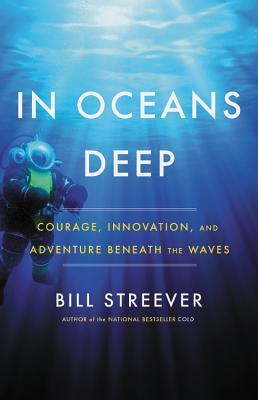ARC Review: In Oceans Deep by Bill Streever

In some ways, this book reminds me of Her Name, Titanic by the immensely talented and brilliant Charles Pellegrino, which is one of my favourite explorations of the depths of the ocean and the depths of space. In it, Pellegrino marvels at how little we know about the earth’s water, what myserious creatures might live at the bottom, where it’s darker than pitch, darker than midnight.
With In Oceans Deep, Streever skillfully outlines the same thesis – that human beings have long focused upward, aiming for the stars, and ignored the wonderland of discovery that exists in the oceans, those uncharted territories and little touched blue deserts.
From the synopsis:
In Oceans Deep celebrates the daring pioneers who tested the limits of what the human body can endure under water: free divers able to reach 300 feet on a single breath; engineers and scientists who uncovered the secrets of decompression; teenagers who built their own diving gear from discarded boilers and garden hoses in the 1930s; saturation divers who lived under water for weeks at a time in the 1960s; and the trailblazing men who voluntarily breathed experimental gases at pressures sufficient to trigger insanity.
Tracing both the little-known history and exciting future of how we travel and study the depths, Streever’s captivating journey includes seventeenth-century leather-hulled submarines, their nuclear-powered descendants, a workshop where luxury submersibles are built for billionaire clients, and robots capable of roving unsupervised between continents, revolutionizing access to the ocean.
I knew little about free diving before beginning this book, and while the scientific methods behind it (which I think Streever spends a bit too much time on) are of little interest to me personally, the limits that people will push their bodies to was fascinating. These free divers “welcome” the convulsions of their diaphragms, fighting to breathe, spit out blood on the surface from lungs on the verge of crushing, and follow lines into the dark, anxious for that next personal record, or world-breaking depth. It’s dangerous, to be sure, but it’s also a testament to how far human beings will go in the name of exploration and the testing of the body.
With captivating prose and an obvious love for the ocean, Streever outlines the ways that we’ve studied the oceans from time immemorial, and the ways we’ve studied how far our bodies – and our machines – can go before they’re broken beneath the crushing weight of water.
It reminds me of mountaineers, tagging peaks and pushing beyond the realms of endurance, to breathe the thinnest air imaginable, while standing on the roofs of the world. It’s these kinds of people who find out what it means to be human, and find out what it means to discover. To stand or go where no one else has been, or where few have been, it must be the ultimate high. Whether they survive or not is almost beside the point – it’s what they come to know, sitting in a tiny submersible, touching the earth six miles down, in the Challenger Deep, where monsters may live.
Where their dreams live, and go on, to the next – the next depth, the next mountain, the next star. The next flicker in the unknown, reminding them what it means to be alive.

